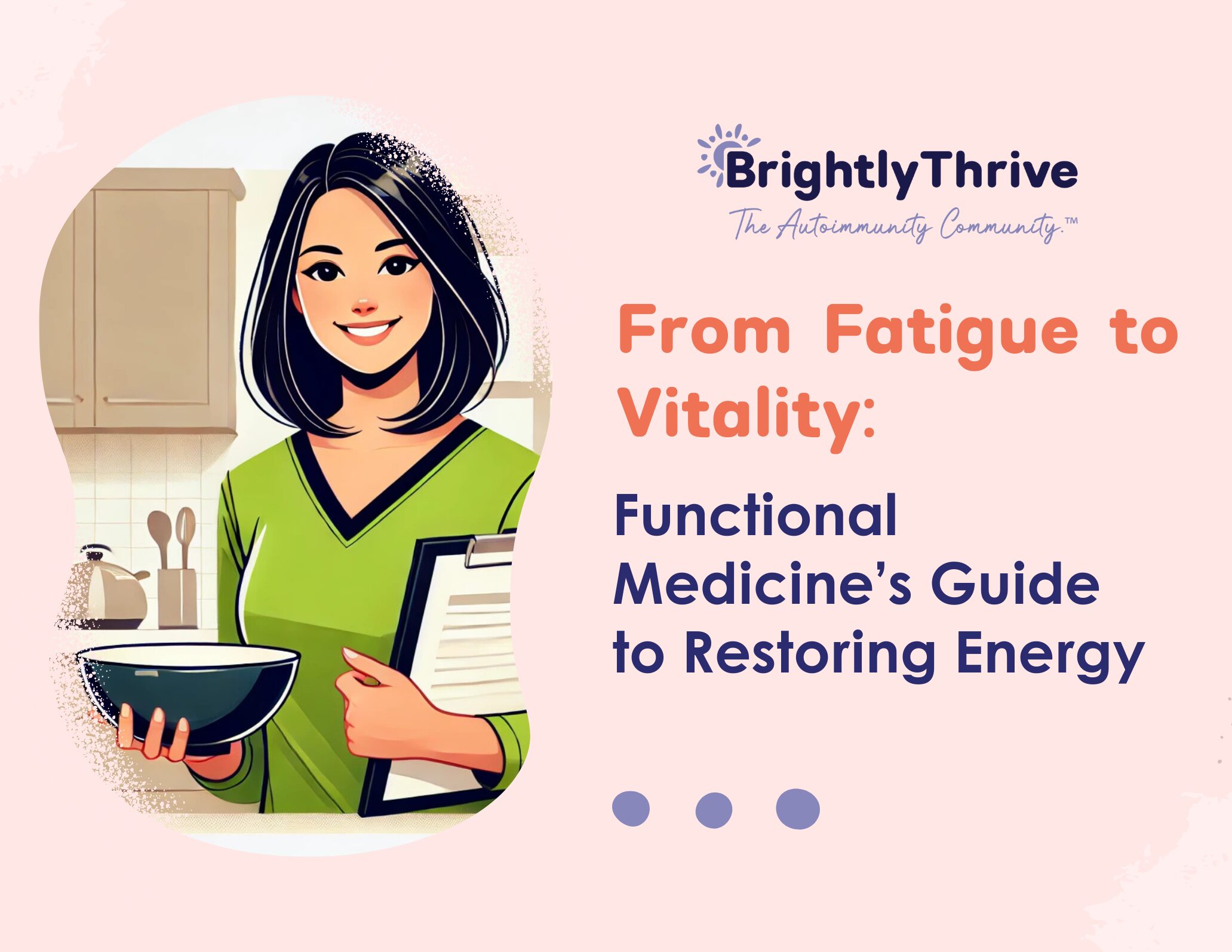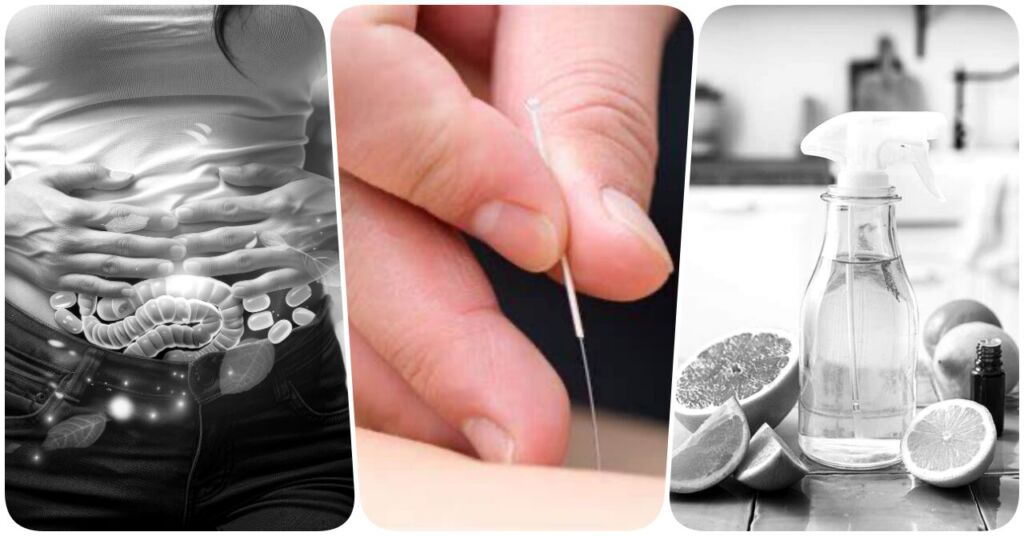
From Fatigue to Vitality: The Functional Medicine Guide to Restoring Energy
Oprah once said, “Energy is the essence of life.” But when fatigue takes over, it can rob us of the ability to live fully and pursue our goals. Functional Medicine provides a solution by addressing the root causes of low energy and offering a path to restore vitality. By taking a holistic approach, Functional Medicine helps us move from autoimmune fatigue to a life filled with energy and purpose.
When rest no longer shakes off that deep-seated tiredness, it’s a clear sign that your body needs more than just sleep to recharge. We’ve all been there—waking up after a full night’s rest only to feel like we never slept at all. That’s when you know it’s time to explore other avenues to restore your energy reservoir.
One of the most effective ways to do this is by looking into safe and natural approaches, especially when you’re dealing with an autoimmune condition. Our bodies, especially when they’re in a delicate balance, can’t always handle harsh treatments or quick fixes. Natural methods, like those promoted in Functional Medicine, often offer a gentler, more sustainable way to rejuvenate our energy levels.
These methods work with your body’s natural systems rather than against them. By focusing on diet, lifestyle changes, stress management, and natural supplements, and other personalized approaches, you can gradually restore your energy in a way that’s kinder to your body and more effective in the long term.
So, if rest isn’t doing the trick anymore, it’s time to listen to your body and consider a holistic approach to replenishing your energy. It might just be the key to feeling like yourself again.
3 Ways You Can Benefit from Functional Medicine
1. Gut Health Optimization

Optimizing gut health is a key focus in Functional Medicine because of its significant impact on immune regulation and overall well-being. When your gut is in good shape, your energy levels can improve, inflammation can decrease, and your immune system can function more effectively. Here’s how you can take practical steps to boost your gut health:
- Incorporate Probiotic and Prebiotic Foods
Support your gut by adding foods rich in probiotics, like yogurt, kefir, sauerkraut, kimchi, and kombucha. These foods introduce beneficial bacteria to your gut. Additionally, nourish these bacteria by consuming prebiotic-rich foods such as garlic, onions, leeks, asparagus, bananas, and oats. - Increase Fiber Intake
Aim for 25-30 grams of fiber daily to fuel the beneficial bacteria in your intestines. This can be achieved by eating a variety of fruits, vegetables, whole grains, and legumes. A fiber-rich diet not only supports regular bowel movements but also fosters a thriving gut environment. - Manage Stress Levels
Chronic stress can throw your gut flora out of balance, leading to digestive issues. Combat this by engaging in stress-reducing activities like yoga, meditation, deep breathing, or spending time in nature. Prioritizing self-care can significantly improve both your mental and digestive health.
2. Acupuncture and Herbal Therapies

When dealing with autoimmune conditions and chronic fatigue, Functional Medicine often recommends complementary approaches like acupuncture and herbal therapies to help restore energy and manage symptoms. These natural methods can regulate the immune system, reduce inflammation, and provide a holistic way to boost your well-being.
Here’s how you can integrate these therapies into your routine:
Consult with a Licensed Practitioner:
- Why? Personalized treatment is key. A licensed acupuncturist or herbalist can tailor therapies specifically to your health needs, ensuring safety and effectiveness.
- Tip: Schedule a consultation with a practitioner experienced in both acupuncture and herbal medicine. They’ll assess your condition and recommend targeted treatments.
Incorporate Anti-Inflammatory and Adaptogenic Herbs:
- Why? Herbs like turmeric, ginger, ashwagandha, and reishi mushroom have powerful anti-inflammatory and immune-balancing properties.
- Tip: Add these herbs to your diet through teas, capsules, or even cooking. They can help manage autoimmune symptoms and support overall energy levels.

Want recipes and AIP tips like this to boost your meal prep routine? Make sure to subscribe to our weekly newsletter so you won’t miss out!
Combine Acupuncture with Herbal Medicine:
- Why? Using both acupuncture and herbal medicine together can enhance their effectiveness, particularly in reducing inflammation and improving symptoms.
- Tip: Work with a practitioner who can integrate both therapies into a cohesive treatment plan. This combined approach can provide a stronger, synergistic effect, helping you feel better faster.
3. Environmental Toxin Reduction

Reducing exposure to environmental toxins is a key focus in Functional Medicine, particularly for those dealing with autoimmune issues and chronic fatigue. Environmental toxins like heavy metals, mold, pesticides, and plastics can trigger inflammation and fatigue, making it harder for your immune system to function properly. By minimizing these exposures, you can help your body operate more efficiently and potentially boost your energy levels. Here’s how you can start:
- Improve Indoor Air Quality:
- Ventilate your home regularly by opening windows to let in fresh air.
- Use a vacuum cleaner with a HEPA filter to remove dust, pet dander, and allergens.
- Add air-purifying houseplants like snake plants or spider plants to absorb toxins.
- Choose Natural Cleaning Products:
- Switch to natural cleaning products made from vinegar, baking soda, and essential oils.
- Avoid conventional cleaners with harmful chemicals that can pollute indoor air.
- Opt for Organic and Locally Sourced Foods:
- Choose organic produce to reduce exposure to pesticides and chemical fertilizers.
- Start with the Environmental Working Group’s “Dirty Dozen” list to prioritize which foods to buy organic.
- Buy locally sourced foods to ensure freshness and lower the environmental impact of long-distance transportation.
- If you’d rather have fresh, quick and “clean” meals, consider supporting stores like Paleo on the Go.
Did you know that BrightlyThrive members get exclusive member perks such as discounts on their first purchase from our partners like Paleo on the Go?
Also, members get access to hundreds of resources from our expert-curated Knowledge Bank, as well as to hundreds of exclusive training videos from our health and wellness coaches, the ThriveGuides.
Become a BrightlyThrive™ member today!
Final Thoughts
Functional Medicine offers a holistic approach to restoring vitality by addressing deeper factors like gut health, using acupuncture and herbal therapies, and reducing environmental toxins. By embracing these natural and sustainable strategies, you can reclaim your energy and move toward a life filled with purpose and joy–even with autoimmunity.
References
Functional Medicine Protocol for Autoimmune Diseases: Balancing the Immune System. (2024, May 28). Rupa Health. https://www.rupahealth.com/post/functional-medicine-protocol-for-autoimmune-diseases-balancing-the-immune-system
Stavy. (2023, May 1). Functional Medicine for Autoimmune Diseases – Dr Stavy Nikitopoulou. Dr Stavy Nikitopoulou. https://drstavy.com/blog/functional-medicine-for-autoimmune-diseases/
Ifmcp, C. M. D. (2023, October 5). The Functional Medicine Solution for Autoimmune Disease – Dr. Christine Maren. Dr. Christine Maren. https://drchristinemaren.com/the-functional-medicine-solution-for-autoimmune-disease/
Diets, N. (2024, March 22). How To Reduce Inflammation & Manage Autoimmune Disease: Functional Medicine Relief Strategies. Nutrition Diets. https://nutritiondiets.co.uk/health/how-to-reduce-inflammation-manage-autoimmune-disease-functional-medicine-relief-strategies/
5 Effective Strategies to Optimize Your Gut Health: Vantage Medical Associates, P.C.: Internal Medicine. (n.d.). Adam L Moskowitz, MD. https://www.vantagemedicalassociates.com/blog/5-effective-strategies-to-optimize-your-gut-health
Crawford, S. (2023, May 23). Supporting Your Digestive System: Three Ways to Improve Gut Health. Yale School of Medicine. https://medicine.yale.edu/news-article/supporting-your-digestive-system-three-ways-to-improve-gut-health/
Herbal Treatments for Autoimmune Disease — Do They Work? (n.d.). WellTheory. https://www.welltheory.com/resources/herbal-treatments-for-autoimmune-disease-do-they-work
Wachtel-Galor, S., & Benzie, I. F. F. (2011). Herbal Medicine. Herbal Medicine – NCBI Bookshelf. https://www.ncbi.nlm.nih.gov/books/NBK92773/
Understanding Environmental Toxins and Their Impact on Health. (2024, May 28). Rupa Health. https://www.rupahealth.com/post/understanding-environmental-toxins-and-their-impact-on-health
Pizzorno J. Toxin Exposure Reduction. Integr Med (Encinitas). 2017 Dec;16(6):8-10. PMID: 30936809; PMCID: PMC6438086.
Understanding Environmental Toxins and Their Impact on Health. (2024b, May 28). Rupa Health. https://www.rupahealth.com/post/understanding-environmental-toxins-and-their-impact-on-health
TAGS:
CATEGORIES:







